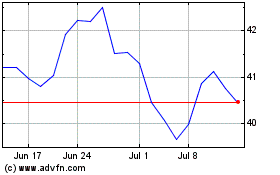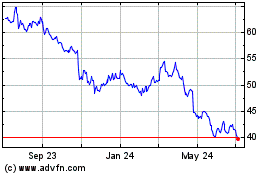Ono Pharmaceutical Co.,Ltd. (Tokyo: 4528), Bristol-Myers Squibb
Company (NYSE:BMY) and Kyowa Hakko Kirin Co., Ltd. (Tokyo:
4151,“Kyowa Hakko Kirin”) announced today the companies have
entered into a clinical trial collaboration agreement to conduct a
Phase 1 combination study with Opdivo (nivolumab), a PD-1 immune
checkpoint inhibitor, and mogamulizumab, an anti-CCR4 antibody. The
study, which will be conducted in Japan, will focus on evaluating
the safety, tolerability and anti-tumor activity of combining
Opdivo and mogamulizumab as a potential treatment option for
patients with advanced or metastatic solid tumors.
Opdivo, launched in Japan in September 2014 for the treatment of
patients with unresectable melanoma, is being developed in multiple
tumor types in more than 50 clinical trials worldwide.
Mogamulizumab was launched in Japan in May 2012 for the treatment
of relapsed or refractory CCR4-positive Adult T-cell
Leukemia-Lymphoma (ATL), and granted the indication expansion in
March 2014 for relapsed or refractory CCR4-positive Peripheral
T-Cell Lymphoma (PTCL) and Cutaneous T-Cell Lymphoma (CTCL).
Clinical trials with mogamulizumab in ATL, PTCL, and CTCL are
ongoing in the U.S., European Union (EU) and other countries.
Opdivo and mogamulizumab are part of a new class of cancer
treatments known as immunotherapies, which are designed to harness
the body’s own immune system in fighting cancer by targeting
distinct regulatory components of the immune system. Opdivo binds
to the checkpoint receptor PD-1 expressed on activated T-cells,
blocking this pathway and enabling the immune system to attack
tumors, while mogamulizumab can suppress some of the immune cells
that shield the tumor from the immune system. Pre-clinical evidence
for each therapy suggests the combination of Opdivo and
mogamulizumab may lead to an enhanced anti-tumor immune response
compared to either agent alone.
“Studying combination regimens of immunotherapies offers the
opportunity to explore the potential of enhanced efficacy compared
to current standards of care in treating cancer,” said Hiroshi
Awata, Member of the Board of Directors, Vice President Executive
Officer/ Executive Director, Clinical Development & Clinical
Development Planning, Ono. “We are delighted to be able to pursue
the possibility of immunotherapies through this collaboration with
Kyowa Hakko Kirin. We believe that there is a strong rationale to
explore the combination of Opdivo and mogamulizumab with the goal
of identifying a new treatment option for these cancer
patients.”
“Our collaboration with Kyowa Hakko Kirin further complements
the broad clinical development program for Opdivo, will advance our
understanding of the combination of Opdivo and mogamulizumab, and
is an example of our commitment to develop combination
immuno-oncology regimens for patients with metastatic cancer,”
stated Michael Giordano, senior vice president, Head of
Development, Oncology, Bristol-Myers Squibb.
“It is exciting for us to build a partnership with Ono and
Bristol-Myers Squibb in immuno-oncology,” said Yoichi Sato,
Managing Executive Officer, Vice President, Head of Research and
Development Division of Kyowa Hakko Kirin. “The planned combination
study will help determine whether the combination of these two
immunotherapies can deliver better outcomes in patients with
advanced cancers.”
The study will be conducted by Ono and Kyowa Hakko Kirin.
Additional details of the collaboration were not disclosed.
About Opdivo (nivolumab)
Cancer cells may exploit “regulatory” pathways, such as
checkpoint pathways, to hide from the immune system and shield the
tumor from immune attack. Opdivo is an investigational, human PD-1
immune checkpoint inhibitor that binds to the checkpoint receptor
PD-1 expressed on activated T-cells.
Opdivo is being studied across multiple tumor types in more than
50 trials – as monotherapy or in combination with other therapies –
in which more than 7,000 patients have been enrolled worldwide.
Among these are several potentially registrational trials in
non-small cell lung cancer (NSCLC), melanoma, renal cell carcinoma
(RCC), head and neck cancer, glioblastoma and non-Hodgkin lymphoma
(NHL).
In 2012, the FDA granted Fast Track designation for Opdivo in
NSCLC, melanoma and RCC. In April 2014, the company initiated a
rolling submission with the FDA for Opdivo in third-line
pre-treated squamous cell NSCLC and expects to complete the
submission by year-end. The FDA granted Opdivo Breakthrough Therapy
Designation in May 2014 for the treatment of patients with Hodgkin
lymphoma after failure of autologous stem cell transplant and
brentuximab. On July 4, Ono Pharmaceutical Co. announced that
Opdivo received manufacturing and marketing approval in Japan for
the treatment of patients with unresectable melanoma and launched
on September 2, making Opdivo the first PD-1 immune checkpoint
inhibitor approved and launched anywhere in the world. On September
26, Bristol-Myers Squibb announced that the FDA accepted for
priority review the Biologics License Application for previously
treated advanced melanoma, and the Prescription Drug User Fee Act
goal date for a decision is March 30, 2015. The FDA also granted
Opdivo Breakthrough Therapy status for this indication. In the EU,
the European Medicines Agency (EMA) has validated for review the
Marketing Authorization Application (MAA) for Opdivo in advanced
melanoma. The application has also been granted accelerated
assessment by the EMA’s Committee for Medicinal Products for Human
Use. The EMA also validated for review the MAA for Opdivo in
NSCLC.
About Mogamulizumab
Mogamulizumab (Brand name: POTELIGEO®) is a novel, humanized mAb
directed against CC chemokine receptor type 4 (CCR4). Engineered by
Kyowa Hakko Kirin's unique POTELLIGENT® Technology, the antibody is
designed to kill its target cells through potent antibody-dependent
cellular cytotoxicity. Mogamulizumab was launched in Japan in May
2012 for the treatment of patients with relapsed or refractory
CCR4-positive adult T-cell leukemia-lymphoma (ATL). The drug was
approved for indication expansion and was granted marketing
authorization in Japan for the treatment of patients with relapsed
or refractory CCR4-positive, peripheral T-cell lymphoma (PTCL) and
cutaneous T-cell lymphoma (CTCL) in March 2014. Clinical trials
with mogamulizumab in ATL, PTCL, and CTCL are ongoing in the US, EU
and other countries.
About Ono
Ono Pharmaceutical headquartered in Osaka, Japan, is an
R&D-oriented pharmaceutical company committed to creating
innovative medicines in specific areas. It focuses especially on
the diabetes and oncology areas. For more information, please visit
the company’s website at http://www.ono.co.jp/eng/index.html.
About Bristol-Myers Squibb
Bristol-Myers Squibb is a global biopharmaceutical company whose
mission is to discover, develop and deliver innovative medicines
that help patients prevail over serious diseases. For more
information, please visit www.bms.com or follow us on Twitter at
http://twitter.com/bmsnews.
About the Bristol-Myers Squibb and Ono Pharmaceutical
Collaboration
In 2011, through a collaboration agreement with Ono,
Bristol-Myers Squibb expanded its territorial rights to develop and
commercialize Opdivo globally except in Japan, South Korea and
Taiwan, where Ono had retained all rights to the compound at the
time. On July 23, 2014, Bristol-Myers Squibb and Ono further
expanded the companies’ strategic collaboration agreement to
jointly develop and commercialize multiple immunotherapies – as
single agents and combination regimens – for patients with cancer
in Japan, South Korea and Taiwan.
About Kyowa Hakko Kirin
Kyowa Hakko Kirin is a leading biopharmaceutical company in
Japan focusing on its core business area of oncology, nephrology
and immunology/allergy. Kyowa Hakko Kirin leverages
antibody-related leading-edge technologies to discover and develop
innovative new drugs aiming to become a global specialty
pharmaceutical company which contributes to the health and
well-being of people around the world. For more information, visit
http://www.kyowa-kirin.com.
Bristol-Myers Squibb Forward-Looking Statement
This press release contains “forward-looking statements” as that
term is defined in the Private Securities Litigation Reform Act of
1995 regarding the research, development and commercialization of
pharmaceutical products. Such forward-looking statements are based
on current expectations and involve inherent risks and
uncertainties, including factors that could delay, divert or change
any of them, and could cause actual outcomes and results to differ
materially from current expectations. No forward-looking statement
can be guaranteed. Among other risks, there can be no guarantee
that this combination regimen will receive regulatory approval, or,
if approved, that it will become a commercially successful product.
Forward-looking statements in this press release should be
evaluated together with the many uncertainties that affect
Bristol-Myers Squibb's business, particularly those identified in
the cautionary factors discussion in Bristol-Myers Squibb's Annual
Report on Form 10-K for the year ended December 31, 2013 in our
Quarterly Reports on Form 10-Q and our Current Reports on Form 8-K.
Bristol-Myers Squibb undertakes no obligation to publicly update
any forward-looking statement, whether as a result of new
information, future events or otherwise.
OnoCorporate
Communicationspublic_relations@ono.co.jporYukio Tani,
y.tani@ono.co.jporKazuhiko Muraoka,
muraoka@ono.co.jporBristol-Myers SquibbMedia:Ken
Dominski, 609-252-5251ken.dominski@bms.comorInvestors:Ranya
Dajani, 609-252-5330ranya.dajani@bms.comorRyan Asay,
609-252-5020ryan.asay@bms.comorKyowa Hakko
KirinMedia:Public Relations Group, Corporate
Communication Dept.,
+81-3-3282-1903media@kyowa-kirin.co.jporInvestors:Investor
Relation Group, Corporate Communication Dept.,
+81-3-3282-0009ir@kyowa-kirin.co.jp
Bristol Myers Squibb (NYSE:BMY)
Historical Stock Chart
From Mar 2024 to Apr 2024

Bristol Myers Squibb (NYSE:BMY)
Historical Stock Chart
From Apr 2023 to Apr 2024
